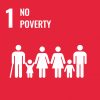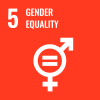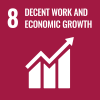Herat, Afghanistan – In the bustling heart of Herat city, the rhythmic sound of noodles being cut fills the air, creating a sense of productivity and hope. The process begins with pristine, locally sourced flour being opened and measured. This flour is then mixed into dough, kneaded meticulously until it reaches the perfect consistency. The dough is transformed into fine, long strands of noodles, which are then cut, each slice producing a satisfying sound that echoes through the business.
"If you cook our noodles, they maintain their texture and consistency, unlike the commercially imported ones. It's all about the ingredients and the process," Nisa, the founder of Mumtaz Rishta Noodles factory, said proudly.

Nisa stands next to freshly made noodles at her business. Photo: IOM/Marjan Wafa
Nisa is a mother of four whose journey began in Bamyan, where she couldn’t pursue education due to the absence of schools in that remote mountainous village. "I always had a strong desire to study, but the only option available was attending a madrasa [religious school]. When I was nine, my family moved to Kabul, where I finally had the opportunity to go to school and continued my education up to the sixth grade."
A few years after moving to Kabul, Nisa's family migrated in 1996 to Iran, following the political upheaval, instability, and power changes in Afghanistan.
Settling in Iran brought its own challenges, as her family arrived with little savings. Despite this, Nisa was determined to continue her education and resumed studying until she was 16. At that point, she married and could no longer attend school.
Like many Afghan women facing challenges in their migration journey, her priorities shifted to supporting her family. After a few daily-wage jobs, Nisa found stable work at a noodle-making factory in Iran, where she worked for more than four years.
In Iran, Nisa and her family faced many challenges, including discrimination. She vividly recalls a painful incident involving one of her daughters.
"During her first-grade graduation ceremony, her teacher refused to take a photo with her simply because she was Afghan. It was a deeply painful experience for me, and I couldn't explain it to my daughter," Nisa shared. "Life in Iran was not easy, but our situation kept improving economically, and most importantly, we felt safe there despite being discriminated against. Safety is relative when all you wish for is to survive."
Nisa and her family continued living in Iran for 20 years, during which she developed her skills at the noodle-making factory and eventually became an expert in the craft.

Freshly made organic noodles at the Mumtaz Rishta factory. Photo: IOM/Mohammad Osman Azizi
Despite the progress Nisa and her family made in Iran, life was still full of uncertainties for them.
"There were always fears and whispers of deportation," Nisa said. "You never truly feel settled when you know you could be forced to leave at any moment."
These fears became a reality in 2018 when Nisa's family was forced to return to Afghanistan, something 2.81 million Afghans had to do from 2021-2023. And from January 2023 to July 2024, 1.7 million undocumented Afghans returned from Iran to Afghanistan, with 60 per cent of them forcibly returned.
Upon their return, Nisa and her family faced new challenges with no jobs and no connections. Her husband was unemployed, making their situation even more difficult.
Nisa sold her precious ring, a keepsake from her time in Iran, and used the money to buy a small machine to start her own noodle business at home using the experience she had gained in Iran.

Nisa showcases the small machine she purchased to start her business after selling her precious ring. Photo: IOM/Avand Azeez Agha
"I always dreamt of having my own business, and if there was a time to do it, it was now! I bought a small machine and started making noodles to sell to local vendors. Despite limited resources, the feedback on my product was overwhelmingly positive," Nisa recalled.
She reinvested the profits into new machinery, slowly expanding her operations.
The early days were filled with challenges. "There were times when I doubted myself," Nisa said. "But the positive feedback from our customers kept me going. They appreciated the organic quality of our noodles, free of additives and preservatives, and that gave me the confidence to continue."
Her determination paid off, and the breakthrough came in 2020 when she learned about IOM’s programme supporting small and medium-sized enterprises. She submitted a business expansion plan to IOM, and after an evaluation, the Organization provided her with the necessary equipment, capital and business development training to scale up her production.
"Before, I could only make about 30kg of noodles per day from home. Thanks to the support we received, we now produce 250kg per day and have hired seven women," said Nisa. "Like me, they are all returnees or internally displaced, and they couldn't continue their education."
"I am motivated by my own journey of migration and hardship, so I want to create a place where other women can learn and grow. Most Afghan women can run businesses and do great things if they have the freedom and opportunity."
Nisa has become a role model in her community. She inspires other women to pursue their dreams by sharing how she overcame obstacles, along with her knowledge of noodle-making and business management.
Such as Nabila*, an internally displaced woman who has been working in the business for three years. "I got married while I was still in the 12th grade. I once dreamed of becoming a doctor, but marriage changed my plans. Many of my colleagues have faced similar experiences," Nabila said.

Nabila and her coworker carefully process the dough into noodles. Photo: IOM/Mohammad Osman Azizi
Originally from Daykundi, Nabila experienced extreme poverty, as farming barely made her family's ends meet. In 2019, they moved to Herat in search of better economic opportunities, and her husband decided to migrate to Iran shortly after that.
"I had just given birth when we moved to Herat, and I had to raise my child alone for two years until my husband recently returned from Iran," said Nabila. She found this job two years after moving to Herat and has since become a valuable member of Nisa’s team.
"Previously, as farmers, we struggled to earn a steady income. Now, with a monthly salary, we can afford essentials and transportation, and our situation has improved a lot," said Nabila.

Nabila hangs the freshly made noodles to dry in the air. Photo: IOM/Mohammad Osman Azizi
"Nisa inspires me every day. She not only gave us jobs but also created an environment where women can learn, grow, and support each other," Nabila continued. "We have regular team meetings where we discuss our work progress and share personal challenges, finding solutions together. This has made our workplace more than just a job; it feels like a second family to me."
Nisa is a true entrepreneur who understands the importance of networking and marketing for business growth. In 2023, she participated in a trade exhibition in Kabul with IOM’s support and successfully made business connections worth USD 5,000.
"Previously, nobody knew about local noodles, and all of them were imported from Iran. Now, our business continues flourishing, supplying local markets in Herat city and even replacing Iranian imports in some retail shops with our superior quality noodles."

A worker packages the noodles, preparing them for sale. Photo: IOM/Avand Azeez Agha
Nisa plans to further expand and hire more women. She is also considering opening a restaurant that would serve dishes with noodles as a main ingredient.
IOM supports small and medium-sized businesses like Mumtaz Rishta by providing capital, equipment, and business development training. This helps businesses retain their existing employees and create new job opportunities.
IOM focuses on areas where high numbers of people have returned to Afghanistan. It aims to strengthen the resilience of individuals and communities by addressing the socio-economic needs of returnees, internally displaced persons, and vulnerable host populations, creating conditions for longer-term solutions and mitigating the factors that might lead to secondary displacement or migration as a last resort.
From January 2023 to June 2024, IOM’s Economic Resilience programme created 12,817 employment opportunities, including 7,810 for women. The programme also supported 552 local businesses with equipment replacement and upgrades, of which 314 were led by women. This was made possible through funding from the European Union Directorate-General for International Partnerships (DG-INTPA), the Italian Agency for Development Cooperation (AICS), and the Special Trust Fund for Afghanistan (STFA).
*Name changed to protect the identity of a returnee.
This story was written by Avand Azeez Agha, with contributions from Mohammad Osman Azizi. For more information, please contact avhasan@iom.int



